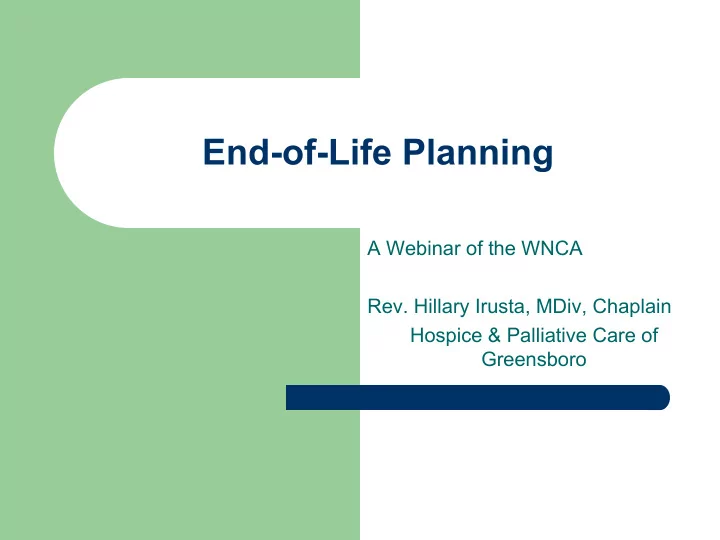

End-of-Life Planning A Webinar of the WNCA Rev. Hillary Irusta, MDiv, Chaplain Hospice & Palliative Care of Greensboro
Advance Care Planning l The process of identifying our healthcare and end-of-life wishes. l And, discussing this plan with our families and healthcare providers
Benefits of Advance Care Planning l Peace of mind for us and our families l Ensures that we have the death that we want, however we define a good death. l Frees us and our families for the important things: like cherishing time together
ADVANCE DIRECTIVES
Health Care Power of Attorney l An individual who can legally make decisions on your behalf, when you cannot. l This is a different document from a Power of Attorney, which covers financial estate authority. l Have a conversation with your HCPOA about your end-of-life wishes.
Living Wills l Document specifying your medical wishes, directing your HCPOA and healthcare providers on how to care for you if you are unable to communicate. l Allows you to specify what kind of life- sustaining measures you want and do not want in several situations.
Living Wills l An incurable, irreversible condition that will result in death in a short period of time – Example: Cancer l Unconsciousness, and physicians determine with high degree of certainty that consciousness will not return. – Example: Accident resulting in total loss of brain activity l Advanced dementia or illness resulting in loss of cognitive ability and physicians determine it is irreversible. – Example: End-stage Alzheimer’s Disease
Living Wills l Life-prolonging, life-support, measures – Respiratory ventilation – Artificial nutrition and hydration – Antibiotics
MEDICAL TERMS TO KNOW
CPR & DNR l CPR is manually pumping the heart, forcing respirations, and utilizing medications to resuscitate the body, if the heart stops beating. l Living Wills do not have authority over CPR. l CPR is standardized practice in the event that the heart stops beating. l DNR, “Do Not Resuscitate,” is a physicians order that can be requested from a physician, if CPR is not wanted.
Comfort Care l The cessation of treatments and mos life- supporting measures l Administering medications that manage pain and discomfort due to symptoms, such as shortness of breath or nausea. l Providing personal care and respecting dignity
Palliative Care Vs. Hospice Palliative Care Hospice l Available to anyone l Available to anyone with suffering with serious a life prognosis of six illness. months or less. l Improves quality of life by l Improves quality of life by addressing symptoms addressing symptoms and stress and stress, through “comfort care” l One does not need to stop treatments to receive l Active treatments are palliative care. stopped. The focus is on end-of-life care.
SPIRITUAL & PRACTICAL DECISIONS FOR END-OF-LIFE
Spiritual Decisions at End-of-Life l Location of Death l How do I define “a good death”? l Environment & Atmosphere l What would I like my loved ones to know? l How would I like my family to remember me and honor me when I am gone?
Spiritual Decisions at End-of-Life l What is “quality of life” for me? l What’s most important for me at the end of my life? l What do I fear about the dying process? l What spiritual or religious practices would I like provided for me and by whom? l What religious, theological, or ethical questions do I have for my faith leader?
Funeral Planning l Burial – Burial location l Cremation – What do I want to be done with my ashes? l Body donation l Selection of a funeral home or crematory l Service
QUESTIONS & COMMENTS
RESOURCES
How To Proceed l Complete your advance directive – Caring Info – Five Wishes l Have a conversation with your physician or your family – Five Wishes – The Conversation Project l Sermon series or a small group in faith community – The Conversation Project – Five Wishes
How To Proceed Cont. l Book discussions – Being Mortal by Atul Gawande – Everything Happens For A Reason And Other Lies I’ve Loved by Kate Bowler l Attend a Death Café – Death Cafe
FINAL QUESTIONS & COMMENTS
Recommend
More recommend